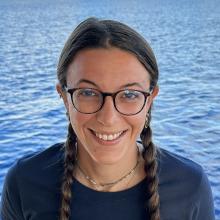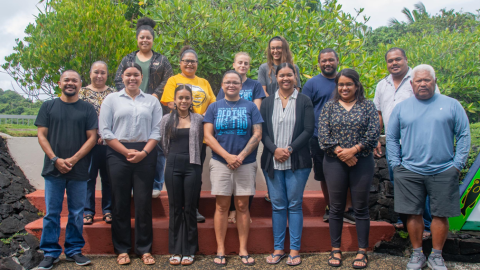
Greta Sartori
Tell us about your work/ research. What kinds of things do you do?
I like to define myself as an "Including, but not limited to" marine ecologist because my research involves interdisciplinary approaches to answer complicated ecological questions. In the past, I have been studying how fish assemblages are influenced by tides, ocean currents and upwellings in one of the main Indonesian Throughflow corridors. Then I moved to Palau, where I am now based, and dived into the analysis of large scale coral reef recovery patterns, investigating the interconnections between seabed shape, water flow (current or waves) and sedimentation. This holistic approach aims to trial new methodologies capable of addressing knowledge gaps in coral reef ecology.
What sparked your initial interest in your career?
Since the first time I have seen a coral reef at eight years old, I was naturally drawn to it. I remember it as if it was yesterday, I came out of the Red Sea and asked my mom: "What do I have to do to swim here for the rest of my life?" and she said I should become a marine biologist. I was very lucky because my family was really into travelling, therefore I had the chance to visit many different reefs during my life. The more I saw and the more I was intrigued about what could be driving the striking differences between reefs, leading to my choice of studying environmental science to not only focus on the biology of reef inhabitants, but on their functioning as an ecosystem.
Who influenced you or encouraged you the most?
My mother, she is the one that started it all. But also all my friends always sustained me by respecting and fueling my childhood dreams, until they became reality!
What element of your work/ study do you think is the most fascinating?
There are so many fascinating aspects about my job. At the Palau International Coral Reef Center we really get to experience nearly every aspect of marine sciences. One of the most fascinating things to me is that we really do not know much about the ocean, and I am not just talking about the deep sea. The more I advance in my career, the more I realize how many knowledge gaps exist in understanding how coral reef function. One thing that I find extremely fascinating is that Scleractinia corals (and other calcifying organisms on reefs) are the only animals able to change the geomorphology of the Earth surface to such large scale. They were able to survive ice ages and sea level changes, withstand cyclones and extreme heat by growing on top of their ruins in a continuous construction-destruction process.
How did you get involved with Ocean Exploration Trust? How did you become part of the expedition team?
I have been invited to the Palau 2024 expedition because I work as a researcher for the Palau government.
What other jobs led you to your current career?
Before my current position I gained experience with internships in Indonesia and Australia, involving a lot of fieldwork, outreach and data analysis activities. With these internship I got the chance to publish my first scientific papers. Following these, I found work as a SCUBA diving guide, first in Australia and then in Italy. These experiences were fundamental in the development of my confidence and capabilities underwater. Then finally, I got hired by the Palau International Coral Reef Center as a researcher.
What are your degrees and certifications?
Bachelor of Science in Natural Sciences -- University of Bologna, Italy
Master of Science in Tropical Marine Biology -- University of Essex, UK
*** CMAS / PADI Divemaster -- Sheikh Coast Diving Center, Egypt / H2BO, Italy
What are your hobbies?
I like photography, drawing and art in general. I also love exploring with stand-up paddleboard or kayak, hiking and any nature-related activity. I am a very active person and I workout on a regular basis.
What advice would you give someone who wants to have a career like yours?
One of the most important things to develop a successful career in the marine sciences is networking with the right people. Then, to become a valuable researcher, it would be best to have a wide range of skills of which the most important in my opinion are 1) the capacity of observing nature, which will allow to identify recurring patterns that could address new questions answered by 2) data analysis which should be a solid skills for any researcher and 3) the capacity of reporting your findings in a simple way. From my perspective, it is also important to be in the right place at the right time, so never stop exploring vacancies and keep an eye out for opportunities that may arise.
While growing up I have been watching so many videos from Nautilus Live. I could not believe what I saw most of the times and the possibility of finding species never seen before really excites me! However, also learning about an ocean exploration expedition organization and dynamics it is extremely interesting to me.
Expeditions
Greta participated in the following Ocean Exploration Trust expeditions:

